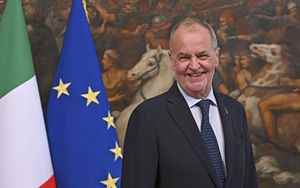(Finance) – “It is in the government program and we intend to make it happen”. That’s what the said Minister of Regional Affairs, Roberto Calderoli, replying to those who asked him about the timing and intention of the government to achieve autonomy. But on this point the Regions are divided.
the theme ofAutonomy today was the focus of a meeting that took place in the Chamber between the Prime Minister Giorgia Melonithe two Deputy Prime Minister Matteo Salvini and Antonio Tajani, Calderoli and, videolinked from Brussels, the Minister for EU Affairs Raffaele Fitto.
The implementation ofarticle 116 of the Constitution, amended in 2001, provides that the Regions with ordinary statute can be attributed further forms and particular conditions of autonomy on a very broad list of matters, also provided for by the Constitution, in article 117. These are those with “concurrent legislative power” between State and Regions (including school, research, foreign trade), plus 3 subjects of state competence that can be devolved, including justice of the peace: there are 23 in all. Lombardy, Veneto and Piedmont have already made it known that they are all interested, the Liguria by Giovanni Totti think of the power over ports, the governor of Tuscany Eugenio Giani focuses on cultural heritage and geothermal energy.
“Excellent news comes from today’s meeting. One more opportunity to hope that the path to autonomy takes shape with this majority, the only one that has been demonstrating from day one that it is keeping its commitments, introducing the project of autonomy definitively in the government program and by tackling the issue head-on – comments the president of the Veneto Region Luca Zaia –. From today’s meeting it emerges that there is harmony in carrying forward the project of autonomy; no one interprets this path as the secession of the rich nor intends to leave anyone else behind. It is true that the vision of a modern state does not disregard the dutiful commitment to assume responsibility, which rhymes with autonomy and federalism. On the part of the Veneto there is full willingness to think about the implementing law, in a constructive and proactive way. In the hope that all those who still have doubts will do so constructively, because saying no a priori to autonomy means disregarding the Constitution. Autonomy is the Constitution, whoever is against it is against the constitution”.
“A further and important step forward in the path that must lead us to the implementation of autonomy. And I say must because there is no doubt that this objective must be achieved without wasting time or attempts aimed solely and exclusively at slowing down the process” – said the president of the Lombardy Region, Attilio Fontana –. First of all in compliance with the Constitution and, also, which is fundamental for us, to follow up on the will of the voters of Lombardy and Veneto who requested Autonomy with the 2017 referendum. We must proceed expeditiously, without delay, making all the legislative and administrative steps necessary to reach the finish line”.
On the contrary, the president of the Campania Region, Vincenzo De Luca. “The Calderoli bill, which is a draft but was presented to us like this, is absolutely unsustainable. First we decide on the essential levels of standard services and costs and then we move forward, it being understood that national unity is a good sacred and inviolable, in particular in relation to the world of school and the protection of the health of Italian citizens.Someone imagines that differentiated autonomy could be valid for the world of school and for health personnel, that is – he continued – to be able to make contracts regional integration for school and health personnel. This would really mean breaking national unity. For the school also on an ideal and training level. The school is the place where the young generations are trained and for the transmission of values, if school programs also become matter of political politics, good night. But if we imagine regional supplementary contracts for health and school personnel, it is clear that via another process of mobility from the South to the North. This battle of ours will have to be included in a battle of a socio-economic nature – concluded the governor -. In the last ten years, 1.5 million citizens have left the South. In the South we have a dramatic problem of depopulation, of a demographic crisis. This, today, is Italy’s biggest emergency. We should start a social battle, which we hope will involve the entire South, with respect to two objectives: a job plan for young people from the South to be employed in the public administration and a system of incentives for private investors”.
